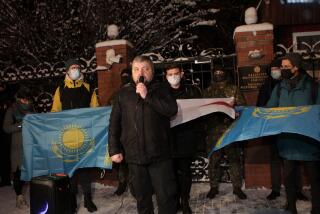Last of Tito’s Aides : Desperate Moments of ’48 Recalled
- Share via
BELGRADE, Yugoslavia — After expelling Yugoslavia from the communist movement in June, 1948, Soviet leader Josef Stalin said, “I’ll wave my little finger, and Tito will be gone.”
He could not have been more wrong.
Marshal Josip Broz Tito defied Soviet power and led Yugoslavia out of Stalin’s camp along his own road to socialism, ruling until his death in 1980. He outlived Stalin by 27 years.
Milovan Djilas, later purged by Tito, was one of Tito’s top three deputies 40 years ago and the only one alive today. The other two were security chief Alexandar Rankovic and economic theorist Edvard Kardelj.
Saved by West, War
Djilas, 76, author of the book “Conversations With Stalin,” still has vivid memories of desperate moments in 1948.
“It eventually led to a point where we feared Stalin would invade Yugoslavia,” he said. “We were saved by the West and the Korean War.
“Without that, Europe’s face could have been drastically changed.”
Stalin had plans to turn the Balkans into small and weak satellite states. But the face of Europe changed in another way. Tito launched a massive purge, throwing thousands of Stalinists into prison.
Nonaligned State
He gradually turned Yugoslavia into today’s nonaligned federal communist state, with its decentralized self-management economy and open borders.
During World War II Soviet troops helped Yugoslav partisans liberate Serbia and Belgrade from the Nazis. The two sides signed treaties of friendship, assistance and economic cooperation after the war.
But even then, there were problems in relations which foreshadowed 1948, Djilas said.
“After Belgrade was liberated, the Russians intruded in our propaganda organs,” he said. “They wanted to be our editors. They tried to recruit spies inside our party organs.
“But relations remained fairly good until we began planning our economy. Our plans for mixed enterprise upset the Russians.
“We were radical and revolutionary but not a satellite. But the Russians tried to impose economic conditions on us, worse than Western capitalists.
“In other East European countries, there were currents inclined towards our policy of independence. We could sense this. They, like us, were more developed than Russia.
“In February, 1948, the Russians organized other Communist parties to criticize me and Kardelj for not being pro-Soviet enough. They invited Tito to a meeting in Moscow.
“We advised him not to go and we told Moscow he was ill. We thought Stalin would have him killed, poisoned.”
(In 1937, when the Yugoslav party was based in exile in the Soviet Union, Stalin had Tito’s predecessor as party leader, Milan Gorkic, executed as a spy and a traitor.)
‘Revisionism’ Claimed
In March, 1948, Moscow sent letters to Yugoslavia accusing Belgrade of anti-Soviet stands, and announced that it was withdrawing military and economic advisers from the country.
Stalin accused Tito of “revisionism,” anti-Sovietism and betrayal of the communist cause.
He attacked Djilas first because Djilas had accused Red Army soldiers of rape and pillage during the liberation of Belgrade.
Personal Dislike
But observers of the period saw the heart of the rift in Stalin’s personal dislike for Tito.
In June, Moscow called a meeting of the Cominform, the international communist movement, in Bucharest, which the Yugoslavs refused to attend. On June 28 the Cominform expelled Yugoslavia.
Stalin launched a media campaign vilifying Yugoslavia and exerted pressure on Yugoslavia’s borders with its Soviet-Bloc neighbors. There were border shootings.
“About 12,000 Yugoslav Stalinists were arrested,” Djilas said. Unofficial reports at the time said up to 200,000 were either arrested or expelled from the Yugoslav party.
Yugoslavia’s ‘Gulag’
Most of the victims were from Yugoslavia’s southern regions, which had historical cultural links with Russia.
In the northern Adriatic, the island prison camp Goli Otok became Yugoslavia’s “Gulag,” flooded with purge victims. Today it is being converted into a holiday resort.
In eastern Europe, Tito became a dirty word. Liberal-leaning personalities were rounded up and tried as “Titoist” spies.
“In 1948 the Russians could not easily have attacked us, as the neighboring satellite countries did not have strong armies,” Djilas said, “and Stalin would not have wanted to go it alone.
“But by 1950, things were different. They planned to attack at the end of that year. The political engagement of the West and the outbreak of the Korean war (in 1950) saved Yugoslavia.”
Visit to London
In 1951 Djilas visited London for a lecture. “Tito and Kardelj asked me to consult (British Prime Minister Clement) Attlee about the possibility of Western help,” Djilas said. “He sat me down beside him and gave me a short answer: ‘We are sympathetic toward your request for military help.’ ”
The U.S. arms sent to Yugoslavia were considered first class by Yugoslav leaders, Djilas said. “We got artillery, tanks, lorries (trucks), everything except modern aviation.” Stalin stood back.
Wealth and Freedoms
In 1953, Stalin died. Tito purged Djilas in 1954 for becoming too liberal. He also purged Rankovic in 1966 for plotting against him.
“Titoism,” self-management economy combined with nonaligned and open foreign policy, gave the 23 million Yugoslavs wealth and freedoms which by the 1970s were envied by other Communist Bloc states. But in the 1980s, the country plunged deep into economic crisis and Tito’s legacy now is being overhauled and reformed.
More to Read
Sign up for Essential California
The most important California stories and recommendations in your inbox every morning.
You may occasionally receive promotional content from the Los Angeles Times.












